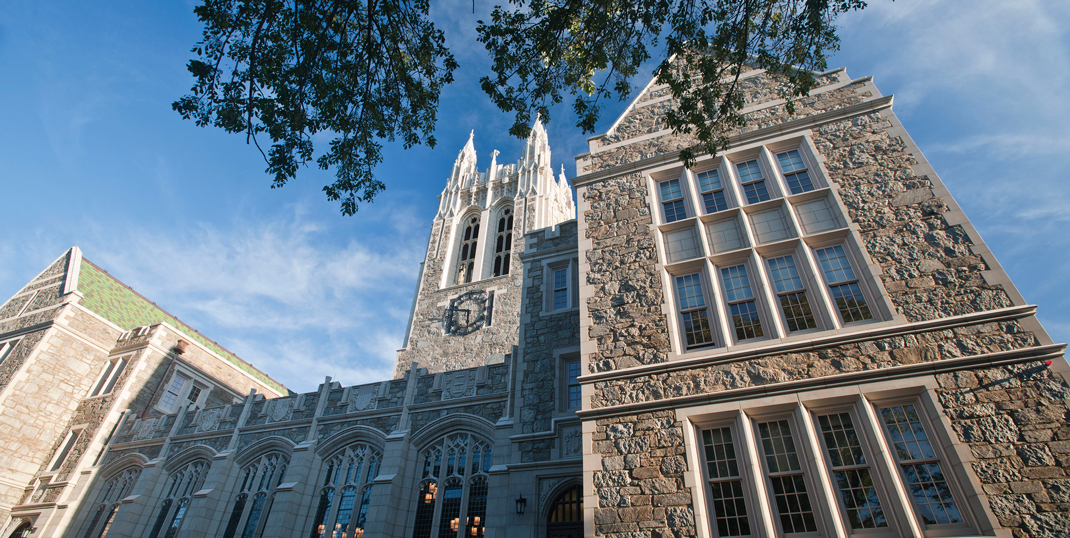Speaking at University Convocation on August 28th, Boston College President William P. Leahy, S.J., pointed to BC’s foundational commitments as the means for the University to respond to social, political, and financial pressures affecting American higher education.
“We should look for renewed vision, inspiration, and direction to the foundational commitments of Boston College,” he said, “which can be summarized by three words: university, Catholic, and Jesuit.”
Provost and Dean of Faculties David Quigley and Executive Vice President Michael Lochhead also offered remarks at Convocation, which was held in Robsham Theater.
Fr. Leahy said higher education institutions, while still enjoying widespread support and recognition of their importance, face increasing scrutiny and skepticism about the value of a college education, especially one focused on the liberal arts. Colleges and universities also are affected by complex, compelling political and social issues, including controversies over race, immigration, climate change, and institutional responses to sexual assault and court decisions, as well as concerns about student mental health. Changing demographics—as exemplified by the predicted decline in the number of 18-year-olds in some regions of the U.S. during the coming decade—will be another factor.
Yet another likely flashpoint is the 2020 election campaign, he added, which has already included discussion on higher education-related topics like free college tuition, student loan forgiveness, and college cost, access, and affordability.
“ We have much reason to approach the future with confidence and ambition, even an institutional boldness and commitment to maintain institutional momentum. ”
But the University’s “Ever to Excel” strategic plan provides a guide to address these challenges, said Fr. Leahy, with its emphasis on BC’s commitments to being a pre-eminent Catholic, Jesuit university.
A university, as a place where teaching, research, inquiry, debate, service, and learning occur, seeks “to stretch its students intellectually and socially and does not merely transmit the past. It is animated by intellectual inquiry and the pursuit of truth,” he explained. A Catholic university, with its focus on the liberal arts and integration of religious commitment and intellectual excellence, helps people become “more able to recognize their gifts and use them for the good of others.” The Jesuit aspect of BC, he added, combines “the best of humanistic education with character formation” and helps students “develop skills in analysis, speaking, and writing as well as a method for learning.”
The clarity of its mission, and the talent and commitment within its community, have BC well-positioned to realize the “great possibilities” ahead, Fr. Leahy said. Looking to 2019-20 and beyond, Fr. Leahy said he hoped for BC to move forward in preparing a new fundraising campaign to build on BC’s progress of the last 50 years, and in devising a plan for developing Lower Campus that aligns with BC’s campus heritage, institutional needs, and fiscal realities. BC should also continue to offer a rigorous, liberal arts-centered, intellectual and formational education, while remaining a vibrant, welcoming intellectual and faith community for people of different backgrounds, experiences, and talents—all striving to model civility and moral and ethical decision-making.
“We have much reason to approach the future with confidence and ambition, even an institutional boldness and commitment to maintain institutional momentum,” he said.
Lochhead spoke on developments related to the University’s financial affairs and facilities. This past fiscal year marked the 48th consecutive year in which BC’s budgeted revenues exceeded budgeted expenses, an achievement he credited to “continued strength in our undergraduate enrollment” and a “diligent and continued focus on expense management to help ensure that resources are devoted to the highest priorities.”
He presented updates on campus construction, including the completion of the Margot Connell Recreation Center and the Pine Tree Preserve, renovations to the auditorium space at 300 Hammond Pond Parkway, and the addition of nine new classrooms— featuring movable seating and white boards to accommodate flexible teaching methodologies—to Carney Hall. Current projects he cited include construction of the new science building, which will house the Schiller Institute for Integrated Science and Society; Phase 2 of the Harrington Athletics Village; and reclamation of the site of the now-demolished Flynn Recreation Complex for green space, recreation, and parking.
“We’ll no doubt need to pace ourselves and match priorities with the availability of resources,” said Lochhead, “but I’m confident in the direction we are headed and the guideposts—like 'Ever to Excel'—that inform our decision-making.”
Quigley listed some academic-related achievements and milestones of the 2018-19 academic year, such as the selection of Isabelle Stone ’18 as BC’s third Rhodes Scholar; the establishment of a curriculum committee for University-wide academic programs; a series of broad-based conversations on formative education; and the graduation of the first BC undergraduate class to study all four years under the Core Curriculum Renewal initiative.
Quigley devoted a significant portion of his remarks to the Schiller Institute, which he linked to the University’s mission of helping address complex societal problems and contribute to the common good, with a particular focus on the sciences. The institute, said Quigley “will strengthen teaching and research in the sciences, expand cross-school collaboration, and enhance Boston College’s ability to address critical global problems in targeted areas such as energy, health, and the environment. Its distinctive programs will be marked by deep and ongoing engagement with the University’s longstanding strengths in the humanities, social sciences, and the professions.”
Among the developments that bear watching for the just-begun academic year, Quigley said, are the arrival of 53 new faculty members, the establishment of a new major in African and African Diaspora Studies, the continuing implementation of the University’s “Ever to Excel” strategic plan, and—echoing Fr. Leahy—a variety of challenges for higher education at the state, regional, and national level, some of which may have direct implications for BC.
—Sean Smith | University Communications | August 2019




